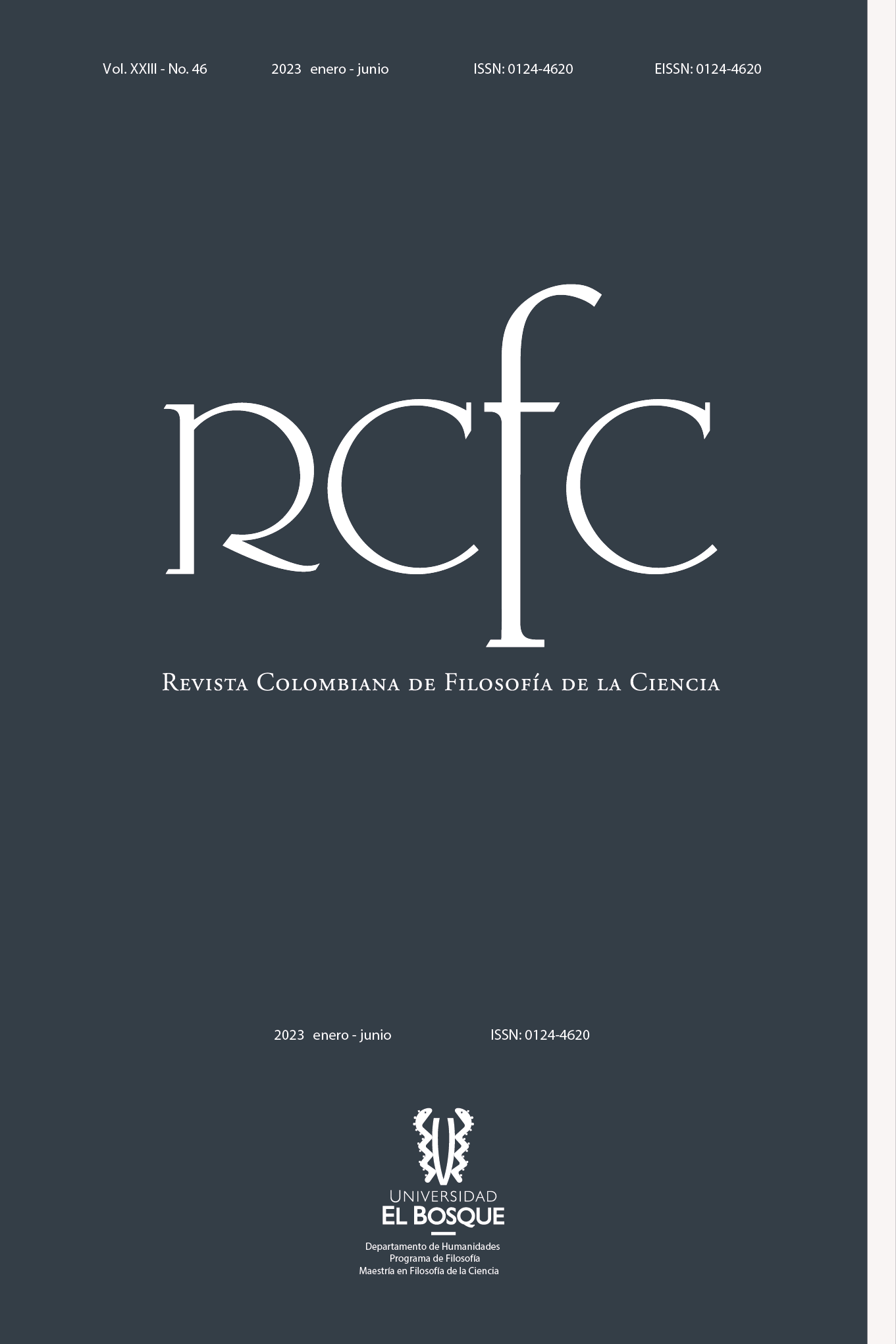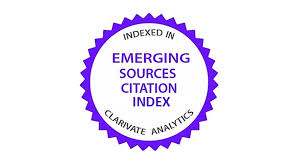Aspectos metafísicos y epistemológicos en la naturaleza e identidad humanas
DOI:
https://doi.org/10.18270/rcfc.v23i46.4183Palavras-chave:
naturaleza humana, identidad humana, especie, humanidad, tipología, filogeniaResumo
A partir de una presentación general del concepto de especie aplicado a los humanos, este texto expone dos nociones generales sobre la naturaleza humana: la tipológica y la filogenética. Una vez expuestos los fundamentos de cada noción, se defiende una distinción entre naturaleza humana e identidad humana como dos aspectos que se han confundido respecto a este problema, pero que cumplen distintos roles en las explicaciones, por lo que se proponen como dos nociones complementarias. Así, la naturaleza humana estaría definida en términos metafísicos y daría cuenta de la realidad biológica de los humanos desde un punto de vista filogenético, mientras que la identidad humana estaría definida en términos epistemológicos y daría cuenta de los conocimientos que tienen los humanos sobre ellos mismos, aludiendo a aspectos contingentes.
Downloads
Referências
Blatti, Stephan. “Animalism” The Stanford Encyclopedia of Philosophy. 2020. Ed. Edward N. Zalta <https://plato.stanford.edu/archives/fall2020/entries/animalism/>
Blatti, Stephan., y Snowdon, Paul F. Animalism New Essays on Persons, Animals, and Identity. Oxford: Oxford University Press, 2016. <https://doi.org/10.1093/acprof:oso/9780199608751.001.0001>
Boyd, Richard. “Realism, Anti-Foundationalism and the Enthusiasm for Natural Kinds”. Philosophical Studies: An Interational Journal for Philosophy in the Analityc Tradition 1.61 (1991): 127-148. <https://doi.org/10.1007/bf00385837>
______ “Homeostasis, Species and Higher Taxa”. Species: New Interdisciplinary Essays. Ed. Robert Wilson. Cambridge: MIT Press, 1999. <https://doi.org/10.7551/mitpress/6396.003.0012>
Caponi, Gustavo. “Tipología y filogenia de lo humano”. Ludus Vitalis 20.37 (2012): 175-191. <https://acortar.link/F2vgx5>
Casetta, Elena. y Vecchi, Davide. “Species are, at the Same Time, Kinds and Individuals: a Causal Argument Based on an Empirical Approach to Species Identity”. Synthese 198.12 (2021): 3007-3025. <https://doi.org/10.1007/s11229-019-02199-5>
Cela-Conde, Camilo. y Ayala, Francisco. “The Advent of Biological Evolution and Humankind”. On Human Nature: Biology, Psychology, Ethics, Politics, and Religion. Ed. Michel Tibayrenc y Francisco J. Ayala. London: Elsevier, 2017. <https://doi.org/10.1016/B978-0-12-420190-3.00001-6>
Diéguez, Antonio. La vida bajo escrutinio. Barcelona: Biblioteca Buridán, 2012.
______ “Concepto fuerte de naturaleza humana y biomejoramiento humano”. Técnica y ser humano. Ed. José Sanmartín y Raúl Gutiérrez. Ciudad de México: Centro de Estudios Filosóficos, Políticos y Sociales Vicente Lombardo Toledano, 2017a.
______ Transhumanismo. Barcelona: Herder, 2017b
Ghiselin, Michael. Metaphysics and the Origins of Species. New York: State University of New York Press, 1997.
Heyd, David. “Human Nature: An Oxymoron?” Journal of Medicine and Philosophy 28.2 (2003): 151-169. <https://doi.org/10.1076/jmep.28.2.151.14205>
Hull, David. “Are Species Really Individuals”. Systematic Zoology 25.2 (1976): 174-191. <https://doi.org/10.2307/2412744>
______ “A Matter of Individuality”. Philosophy of Science 45.3 (1978): 335-360. <https://doi.org/10.1086/288811>
______ “Indivituality and Selection”. Annual Review of Ecology and Systematics 11.1 (1980): 311-332. <https://doi.org/10.1146/annurev.es.11.110180.001523>
______ “On Human Nature”. PSA: Proceedings of the Biennal Meeting of the Philosophy of Science Association 2.1 (1986): 3-13. <https://www.doi.org/10.1086/psaprocbienmeetp.1986.2.192787>
Lewens, Tim. “Human Nature: The Very Idea”. Philosophy & Technology 25.4 (2012): 459-474. <https://www.doi.org/10.1007/s13347-012-0063-x>
Locke, John. An Essay Concerning Human Understanding. Trad. E. O’Gorman. México D.F.: FCE, 1999 (1690).
Machery, Edouard. “A Plea for Human Nature”. Philosophical Psychology 21.3 (2008): 321-329. <https://www.doi.org/10.1080/09515080802170119>
Nagel, Thomas. Mind and cosmos. Why the Materialist Neo-Darwinian Conception of Nature Is Almost Certainly False. Oxford: Oxford University Press, 2012.
Nussbaum, Martha. Frontiers of Justice. Disability, Nationality, Species Membership. Cambridge: Harvard University Press, 2006. <https://doi.org/10.2307/j.ctv1c7zftw>
Okasha, Samir. “Darwinian Metaphysics: Species and the Question of Essentialism”. Synthese 131.2 (2002): 191–213. <https://www.doi.org/10.1023/A:1015731831011>
Orellana Benado, Miguel. “Negociación moral”. Causas perdidas. Ed. Miguel Orellana Benado. Santiago: Catalonia, 2010.
_______ Prójimos lejanos. Santiago: Ediciones UDP, 2011.
Popper, Karl y Eccles, John. The Self and It Brain. An Argument for Interactionism. London: Routledge, 1977. <https://doi.org/10.1007/978-3-642-61891-8>
Ramsey, Grant. “Human Nature in a Post-Essentialist World”. Philosophy of Science 80.5 (2013): 983–993. <https://www.doi.org/10.1086/673902>
Rojas Mix, Miguel. América imaginaria. Santiago: Erdosain-Pehuén, 2017 (1992).
Roughley, Neil. “Human Nature”. The Stanford Encyclopedia of Philosophy, 2021. Ed. Edward N. Zalta <https://plato.stanford.edu/archives/spr2021/entries/human-nature/>
Samuels, Richard. “Science and Human Nature”. Royal Institute of Philosophy Supplement 70.1 (2012): 1-28.
Scruton, Roger. On Human Nature, Princeton: Princeton University Press, 2017.
Willmore, Katherine. “The Body Plan Concept and Its Centrality in Evo-Devo”. Evolution: Education and Outreach 5.2 (2012): 219-230.

Downloads
Publicado
Como Citar
Edição
Seção
Licença

Este trabalho está licenciado sob uma licença Creative Commons Attribution-NonCommercial-NoDerivatives 4.0 International License.

| Métricas do artigo | |
|---|---|
| Vistas abstratas | |
| Visualizações da cozinha | |
| Visualizações de PDF | |
| Visualizações em HTML | |
| Outras visualizações | |










